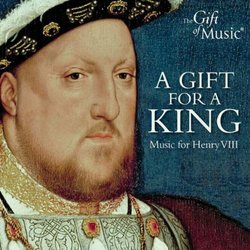| All Artists: Magdala Title: A Gift for a King Members Wishing: 0 Total Copies: 0 Label: The Gift of Music Original Release Date: 1/1/2009 Re-Release Date: 2/1/2009 Genre: Classical Style: Opera & Classical Vocal Number of Discs: 1 SwapaCD Credits: 1 UPC: 658592122121 |
Search - Magdala :: A Gift for a King
 | Magdala A Gift for a King Genre: Classical
A collection of glorious sacred music which was presented as a gift to Henry VIII in 1526 by the city of Florence. Music by the great European composers of the day which was known to Henry and heard in his great chapels th... more » |
Larger Image |
CD Details
Synopsis
Product Description
A collection of glorious sacred music which was presented as a gift to Henry VIII in 1526 by the city of Florence. Music by the great European composers of the day which was known to Henry and heard in his great chapels throughout the land, in an atmospheric recording by Oxford's finest mixed-voice choir. England's great musical heritage has its roots in the reign of the most famous of Tudor monarchs - Henry VIII. Yet, many are surprised to find that, of the thousands of musical manuscripts that must have circulated during that culturally rich time, only a handful have come down to us intact. The great choir-books now at Eton, Caius College in Cambridge, and Lambeth Palace are among our main sources for this period, and, today, much of that music has been performed and recorded by modern choirs. However, the musical tap does not dry up here. Cultural exchange in the early sixteenth century included not only literature and paintings, but also the most passionate of all the arts: Music. The music on this disc represents but one of the many musical gifts from Renaissance Europe, and is selected from the so-called 'Newberry-Oscott' part-books which were compiled in around 1526 as a tribute from the city of Florence to Henry VIII. The collection includes pieces for four, five and six voices; the majority of compositions are by Philippe Verdelot, a French composer who settled in Florence towards the end of his life. Other composers include the Belgian-born Adrianus Willaert, who died in Venice, and the Frenchmen Claude Sermisy and Jean Lheritier. It is thought that the entire collection was compiled under the supervision of Verdelot himself. The composer arrived in Florence in May of 1521, and he is known to have circulated with Machiavelli and other republican intellectuals. During his time in the City he held the most prestigious musical positions there: maestro di cappella at the Baptistery of S. Maria del Fiore (from 24 March 1522 at the latest to 7 September 1525) and at the cathedral (2 April 1523 to 28 June 1527). The themes of the motets in the Newberry-Oscott part-books are typical for the first quarter of the 16th century, being either Marian devotions, items for the Mass (such as Willaert's hauntingly beautiful Pater noster, or texts from the psalter. Two, however, are in tribute to the great kings of France and England: the collection begins with a motet to François I by Sermisy (Quousque non reverteris pax), and the last motet is one in tribute to Henry VIII (Nil majus superi vident). Owing to the inclusion of the Sermisy (the first motet in the collection) it is thought that the books might have originally been intended as a gift to the French, but the later inclusion of the motet to Henry VIII, and the fact that the books were part of Henry's library in the 16th century confirm that the final destination was England. There are only two other examples of works written to honour Henry, and both are by English composers. Nil majus superi vident is anonymous in the Newberry-Oscott part-books, but stylistic considerations point to Verdelot as the composer. The work is based on a specially composed soggetto cavato, set to the words 'Henricus dei gratia Anglie rex (Henry, by the grace of God, the English King). The text itself is most flattering, and, if the collection was indeed intended as a diplomatic gift, there is little doubt that the work would have raised a satisfied grin from the King. As this was a musical offering from Florence to the English, we thought it fitting, as an English choir, to return the gesture and perform the same music to modern-day Florentines. The recording itself took place in the great monastery of San Salvatore al Monte near the great Piazza Michelangelo overlooking the city of Florence.

 Track Listings (15) - Disc #1
Track Listings (15) - Disc #1